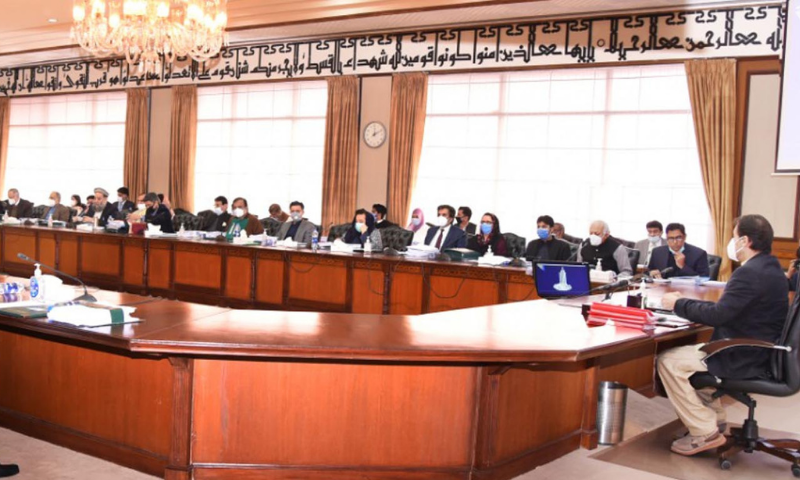ISLAMABAD: To curb increasing rape incidents in the country, the federal cabinet on Tuesday approved in principle two anti-rape ordinances that “change the definition of rape” and are aimed at awarding exemplary punishment to rapists, including chemical castration and hanging, but not in public.
A meeting of the cabinet, chaired by Prime Minister Imran Khan, also endorsed a recent decision of the Economic Coordination Committee regarding restructuring and retrenchment in the Pakistan International Airlines.
The cabinet also discussed over Rs1 trillion Karachi Transformation Plan and the prime minister observed that the plan, aimed at addressing basic civic issues of the metropolis, was not continuing at the pace he desired.
The government termed the approval of the Anti-Rape (Investigation and Trial) Ordinance 2020 and Pakistan Penal Code (Amendment) Ordinance 2020 a “big decision” and said it was for the first time in the history of the country that the definition of rape had been changed by incorporating “transgender” and “gang-rape” in it. The proposed law also prohibits controversial “two-finger” test by doctors that involves testing for laxity of vaginal muscles with fingers.
Proposed ordinances change definition of rape, allow chemical castration, hanging of convicts
“The federal cabinet has approved anti-rape ordinances which change the basic definition of rape and suggest severe punishment for gang rape and hanging of rapists,” said Information Minister Shibli Faraz in a post-cabinet meeting press conference.
He said the ordinances would be finalised in a week.
Human Rights Minister Dr Shireen Mazari said in tweet: “Cabinet Committee on Disposal of Legislative Cases (CCLC) will now finalise (the ordinances) and it should become operational in next few days. It includes an expansive definition of rape, establishment of special court, anti-rape crisis cell, protection of victims and witnesses and prohibition of two-finger test,” she said.
Mr Faraz said Prime Minister Khan, after taking serious notice of a recent rape incident of a mother and her daughter in Sindh, had asked Law Minister Farogh Naseem to prepare comprehensive ordinances encompassing fast-track trial of the accused, comprehensive definition of rape, inclusion of new offences and strict punishments for convicted rapists.
The minister said as the ordinances were of great importance and involved punitive actions against the rapists, it was forwarded to the law division for further improvement.
He expressed the hope that the initiative would significantly reduce the number of rape incidents in the country by creating deterrence against the offence in the society.
Minister for Science and Technology Fawad Chaudhry, while talking to Dawn, termed approval of the ordinances a landmark achievement of the government by addressing one of the gravest issues of the society. He said the ordinances also permitted chemical castration of habitual rapists. This sort of punishment was first hinted at by the prime minister some time back when he said such punishment was being awarded to habitual rapists in developed countries.
Another minister said some of the cabinet members called for public hanging of rapists but some others opposed it.
Minister for Religious Affairs Noorul Haq Qadri demanded that rapists should be hanged in public while Law Minister Naseem said public hanging was “un-Islamic” and “unconstitutional” as described by the Supreme Court.
Later, after a discussion on a proposal to appoint lawmakers in board of directors of government entities, Prime Minister Khan said that the matter should be sent to the Supreme Court for seeking guidance.
Following the deferring of payment of Pakistan’s $2 billion loans by G-20 states, the cabinet permitted the Economic Affairs Division to make new agreements of re-scheduling of loans with 16 countries of G-20.
To promote information technology in the country, the prime minister ordered establishment of 50 technology zones in different cities, including Islamabad, Lahore, Karachi, Haripur and Quetta.
No wheat, sugar crisis
During the press conference, federal ministers Hammad Azhar and Khusro Bakhtiar claimed that there was no shortage of wheat and sugar in the county and their prices were declining by Rs10 to Rs12 at wholesale level.
“Reduction of Rs10 to Rs12 has been witnessed in ex-mill price of sugar during the last 10 days,” Mr Azhar claimed.
He said it was for the first time in the county’s history that sugarcane crushing had started in time by the sugar mill owners.
Mr Bakhtiar said the price of 40kg bag of wheat flour had been by Rs200 in the country. “It (a 40kg bag of flour) is now selling at the rate of Rs2,200 against its previous rate of Rs2,400,” he added.
No restriction for Nawaz
On the political front, Mr Faraz said there was no restriction on former prime minister Nawaz Sharif, his sons and former finance minister Ishaq Dar from coming to Pakistan to attend the funeral of the PML-N supremo’s mother.
He said jailed PML-N leaders Shehbaz Sharif and Hamza Shehbaz were being released on parole to that they could attend the funeral of Begum Shamim Akhtar.
On Monday, the PML-N had sought at least a two-week parole for party president Shehbaz and his son Hamza to participate in the last rites of Begum Shamim. Both Shehbaz and Hamza are in Kot Lakhpat jail on judicial remand in a money laundering and assets beyond means case.
Begum Shamim Akhtar, mother of Mr Nawaz and Mr Shehbaz, had passed away in London on Nov 22. She was in her 90s and had been unwell for a month or so, sources in the party had said.
Arrangements are being made to bring her body to Lahore in a couple of days to be buried next to the grave of her husband Mian Sharif at the family’s Jati Umra estate.
“They (Sharifs) are welcome to come to Pakistan and attend the funeral,” Mr Faraz said, adding that opposition was trying to do politics on the matter.
“The narrative of state suppression is a deliberate propaganda and an attempt to politicise this issue. Who are you trying to fool?” the minister said.
Published in Dawn, November 25th, 2020















































